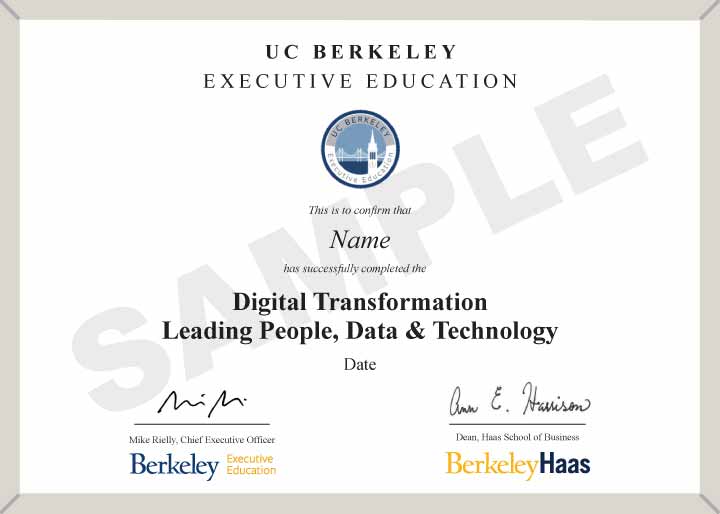The benefit of learning together with your friend is that you keep each other accountable and have meaningful discussions about what you're learning.

Courtlyn
Promotion and Events Specialist
May 30, 2024
2 months, online
4-6 hours per week
Participants report that enrolling in a program with colleagues fosters collaborative learning and amplifies their impact.
Please provide your details to get more information about the group-enrollment pricing.
The benefit of learning together with your friend is that you keep each other accountable and have meaningful discussions about what you're learning.

Courtlyn
Promotion and Events Specialist
Enrolling in this program is the first step in your journey to alumni benefits.
Learn More
This online program is designed for:
Representative functions and industries of past participants include:
This program will position you to:

Videos

Live Webinars

Peer Discussions

Case Studies

Assignments

Polls

Quizzes

Capstone

Live Office Hours
There’s no question that data and technology are key levers for digital transformation, but it’s also about people and organizational alignment. While much of this online program focuses on opportunities for advancing your strategic digital plan, there is also an emphasis on people and the organization.
Learn about a framework for digital transformation and successful examples within companies.
Explore different experimental approaches that business leaders should consider for determining whether digital transformations have resulted in desired outcomes.
Analyze the use of descriptive, predictive, or prescriptive modeling and how to assess the different sources of data and problems related to the quantity and format.
Master looking at processes through a customer-centric lens to identify the scope of improvement and create process flows for your organization.
Understand how subscription models are driving massive growth and the difference between dynamic and personalized pricing.
Identify the importance of specifying strategic imperatives for a digital transformation and the key performance indicators that can be used to measure an organization's performance relative to these imperatives.
Understand the regulations around data collection and usage and the ethical questions that emerge. Explore algorithmic bias and uncover when and why algorithmic decisions can be biased. Capitalize on the process differences with data analytics practices for swift development cycles.
For your capstone project, summarize the takeaways from the previous modules and place them into the context of an entire strategy for your firm.
Learn about a framework for digital transformation and successful examples within companies.
Understand how subscription models are driving massive growth and the difference between dynamic and personalized pricing.
Explore different experimental approaches that business leaders should consider for determining whether digital transformations have resulted in desired outcomes.
Identify the importance of specifying strategic imperatives for a digital transformation and the key performance indicators that can be used to measure an organization's performance relative to these imperatives.
Analyze the use of descriptive, predictive, or prescriptive modeling and how to assess the different sources of data and problems related to the quantity and format.
Understand the regulations around data collection and usage and the ethical questions that emerge. Explore algorithmic bias and uncover when and why algorithmic decisions can be biased. Capitalize on the process differences with data analytics practices for swift development cycles.
Master looking at processes through a customer-centric lens to identify the scope of improvement and create process flows for your organization.
For your capstone project, summarize the takeaways from the previous modules and place them into the context of an entire strategy for your firm.
Across all industries, digital technologies have changed how information is transmitted and processed. Every organization is effectively an information company, and every industry is vulnerable to some degree of disruption. Learn from these examples:

Optimize hospital patient flow in an emergency department.

Conduct network analysis to find the high-value customers and leverage those relationships.

Use A/B testing to determine the effectiveness of advertising—how much exposure is enough to convert?

Optimize an in-store shopping order using “shopper engineering” from Instacart and predict what item the shopper will add to cart next.

Using indoor location tracking of airline passengers, learn how predictive and prescriptive analytics help understand where passengers go and what services to offer them.
UC Berkeley Executive Education's faculty have strong relationships with industry. Content from the program is either inspired by or directly derived from research and applications from companies that include:

One of the most notorious data breaches of all time occurred when Cambridge Analytica sold Facebook user data and violated the terms and conditions of the API. Learn the ways that legal and ethical considerations factor into digital business transactions.

The customer experience was suffering at Panera Bread due to long order and wait times. Being a data-driven company, they studied the problem using customer data and launched an ‘order-ahead’ mobile app, greatly decreasing order and wait times. They also updated the staffing algorithm, achieving operational gains.

How does a payment platform become ubiquitous? It requires both buyers and sellers to get on board, presenting the old chicken and the egg conundrum: which comes first? Learn how a onesided market evolves into a two-sided market where both buyers and sellers derive value.

Imagine you are tasked with creating the best driving routes to provide the ‘last mile’ of residential delivery service to customers. How can data help you find the optimal routes for your drivers? We’ll pull from descriptive, predictive, and prescriptive analytics techniques to solve this challenge
Note: All product and company names are trademarks or registered trademarks of their respective holders. The study of these products and/or companies does not imply any affiliation with or endorsement by them.
Enrolling in the Digital Transformation : Leading People, Data & Technology program can become your first step toward pursuing the UC Berkeley Executive Education Certificate of Business Excellence (COBE). The Certificate of Business Excellence gives individuals the opportunity to acquire and hone new skills and do it on a timeline that works with your busy schedule. Participants will earn a mark of distinction with certification from a world-class university, and enjoy the flexibility of completing the program in up to three years.
Learn more about the program and associated alumni benefits here.
Networking and events
Exclusive Berkeley Resources
News and communication
Note: All benefits subject to change.

Get recognized! Upon successful completion of the program, UC Berkeley Executive Education grants a verified digital certificate of completion to participants. Participants must complete 80% of the required activities including a capstone project (if any) to obtain the certificate of completion. This program also counts toward a Certificate of Business Excellence.
Successful completion of this program fulfills two curriculum days (minimum requirement of 17 curriculum days) towards the UC Berkeley Certificate of Business Excellence (COBE).
Learn more on how it works here.
Note: This program results in a digital certificate of completion and is not eligible for degree credit/CEUs. After successful completion of the program, your verified digital certificate will be emailed to you in the name you used when registering for the program. All certificate images are for illustrative purposes only and may be subject to change at the discretion of UC Berkeley Executive Education.

After reviewing the information on the program landing page, we recommend you submit the short form above to gain access to the program brochure, which includes more in-depth information. If you still have questions on whether this program is a good fit for you, please email learner.success@emeritus.org, and a dedicated program advisor will follow-up with you very shortly.
Some programs do have prerequisites, particularly the more technical ones. This information will be noted on the program landing page, as well as in the program brochure. If you are uncertain about program prerequisites and your capabilities, please email us at the ID mentioned above.
Note that, unless otherwise stated on the program web page, all programs are taught in English and proficiency in English is required.
More than 50 percent of our participants are from outside the United States. Class profiles vary from one cohort to the next, but, generally, our online certificates draw a highly diverse audience in terms of professional experience, industry, and geography — leading to a very rich peer learning and networking experience.
Check back to this program web page or email us to inquire if future program dates or the timeline for future offerings have been confirmed yet.
Each program includes an estimated learner effort per week. This is referenced at the top of the program landing page under the Duration section, as well as in the program brochure, which you can obtain by submitting the short form at the top of this web page.
We have designed this program to fit into your current working life as efficiently as possible. Time will be spent among a variety of activities including:
The program is designed to be highly interactive while also allowing time for self-reflection and to demonstrate an understanding of the core topics through various active learning exercises. Please email us if you need further clarification on program activities.
More than 300,000 learners across 200 countries have chosen to advance their skills with Emeritus and its educational learning partners. In fact, 90 percent of the respondents of a recent survey across all our programs said that their learning outcomes were met or exceeded.
All the contents of the course would be made available to students at the commencement of the course. However, to ensure the program delivers the desired learning outcomes the students may appoint Emeritus to manage the delivery of the program in a cohort-based manner the cost of which is already included in the overall course fee of the course.
A dedicated program support team is available 24/5 (Monday to Friday) to answer questions about the learning platform, technical issues, or anything else that may affect your learning experience.
Peer learning adds substantially to the overall learning experience and is an important part of the program. You can connect and communicate with other participants through our learning platform.
Each program includes an estimated learner effort per week, so you can gauge what will be required before you enroll. This is referenced at the top of the program landing page under the Duration section, as well as in the program brochure, which you can obtain by submitting the short form at the top of this web page. All programs are designed to fit into your working life.
This program is scored as a pass or no-pass; participants must complete the required activities to pass and obtain the certificate of completion. Some programs include a final project submission or other assignments to obtain passing status. This information will be noted in the program brochure. Please email us if you need further clarification on any specific program requirements.
Upon successful completion of the program, you will receive a smart digital certificate. The smart digital certificate can be shared with friends, family, schools, or potential employers. You can use it on your cover letter, resume, and/or display it on your LinkedIn profile.
The digital certificate will be sent approximately two weeks after the program, once grading is complete.
No, only verified digital certificates will be issued upon successful completion. This allows you to share your credentials on social platforms such as LinkedIn, Facebook, and Twitter.
UC Berkeley Center for Executive Education, dba Berkeley Executive Education, is a California nonprofit organization formed for the purpose of operating executive education programs in support of UC Berkeley and the Haas School of Business.
No, there is no alumni status granted for this program. In some cases, there are credits that count toward a higher level of certification. This information will be clearly noted in the program brochure.
You will have access to the online learning platform and all the videos and program materials for 12 months following the program start date. Access to the learning platform is restricted to registered participants per the terms of agreement.
Participants will need the latest version of their preferred browser to access the learning platform. In addition, Microsoft Office and a PDF viewer are required to access documents, spreadsheets, presentations, PDF files, and transcripts.
Yes, the learning platform is accessed via the internet, and video content is not available for download. However, you can download files of video transcripts, assignment templates, readings, etc. For maximum flexibility, you can access program content from a desktop, laptop, tablet, or mobile device.
Video lectures must be streamed via the internet, and any livestream webinars and office hours will require an internet connection. However, these sessions are always recorded, so you may view them later.
Yes, you can register up until seven days past the published start date of the program without missing any of the core program material or learnings.
The program fee is noted at the top of this program web page and usually referenced in the program brochure as well.
Yes, you can do the bank remittance in the program currency via wire transfer or debit card. Please contact your program advisor, or email us for details.
Yes! Please email us with the details of the program you are interested in, and we will assist you.
Please email us your invoicing requirements and the specific program you’re interested in enrolling in.
Yes, the flexible payment option allows a participant to pay the program fee in installments. This option is made available on the payment page and should be selected before submitting the payment.
Please connect with us via email for assistance.
Emeritus collects all program payments, provides learner enrollment and program support, and manages learning platform services.
For the program refund and deferral policy, please click the link here.
Flexible payment options available.